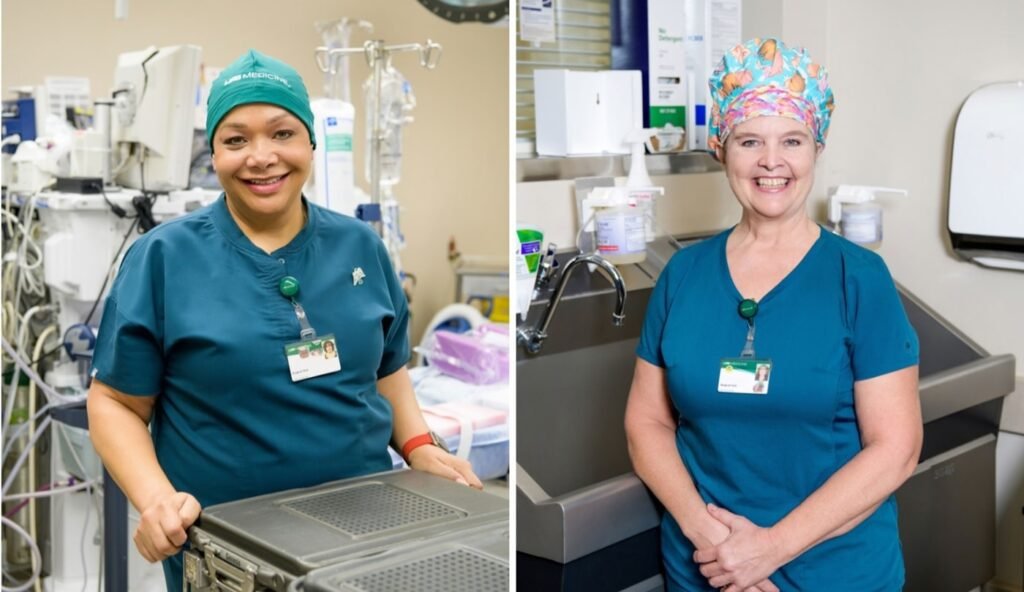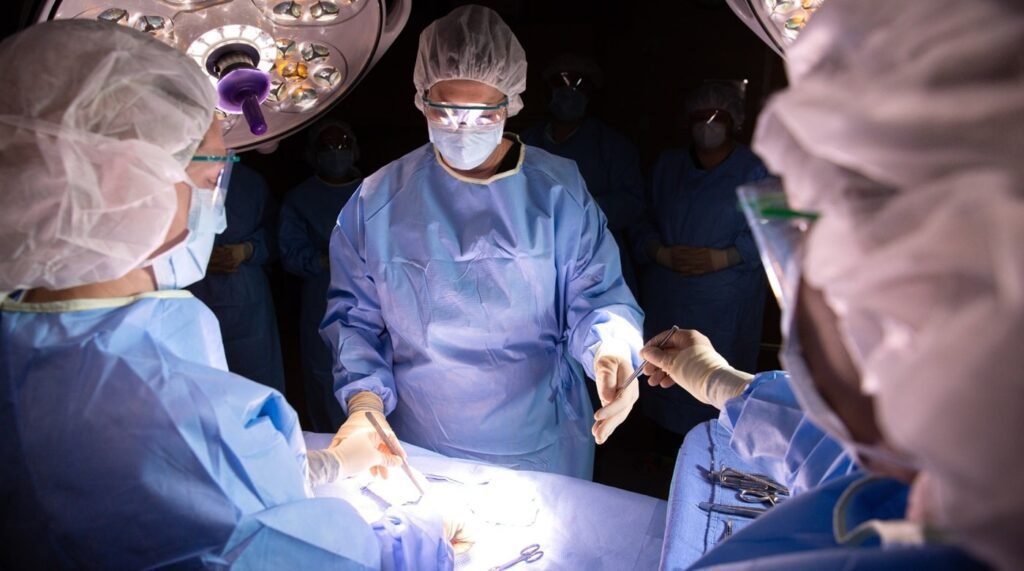Introduction:
In the meticulously orchestrated world of surgery, where every second counts and precision is non-negotiable, there exists a team of unsung heroes who play a pivotal role in the success of each operation. These are the Surgical Technologists – the backbone of the operating room, working diligently behind the scenes to ensure the smooth and safe conduct of surgical procedures. Often overshadowed by the more prominent roles of surgeons and nurses, these technologists are the unsung orchestrators of the surgery, their importance unparalleled yet frequently understated.
This article aims to shed light on the indispensable role of Surgical Technologists. It’s a journey into the heart of the operating room, where we explore the intricacies of their work, the rigorous training they undergo, and the critical importance of their role in patient care. From the pre-operative preparations to the intense moments of surgery, and the post-operative procedures, Surgical Technologists are the linchpins ensuring that every instrument is in place, every surface is sterile, and every procedure is carried out with the utmost precision.
Theirs is a world where the stakes are high, and the rewards, while often intangible, are immeasurably significant. As we delve into the day-to-day realities and the profound impact of their work, we come to appreciate the essential role Surgical Technologists play in the realm of healthcare, making them invaluable members of the surgical team.
Role and Responsibilities of Surgical Technologists
Pre-Operative Duties:
The role of a Surgical Technologist begins long before the first incision is made. Their pre-operative responsibilities are crucial in setting the stage for a successful surgery.
- Preparing the Operating Room:
- Setting up Surgical Instruments and Equipment: This involves arranging the instruments in the order of their use during the procedure. The technologist ensures that every piece of equipment, from scalpels to sutures, is readily accessible to the surgeon.
- Organizing the Operating Room: They arrange the equipment and furniture in a manner that allows for optimal workflow and accessibility during the procedure.
- Sterilization:
- Ensuring Sterility: A key responsibility is to ensure that all instruments and supplies are sterile. This involves operating sterilization equipment, like autoclaves, and meticulously checking the sterility indicators.
- Maintaining a Sterile Environment: They also play a role in maintaining the overall sterility of the operating room, including the use of sterilized gowns, gloves, and masks.
- Assisting with Patient Preparation:
- Positioning the Patient: The surgical technologist assists in correctly positioning the patient on the operating table, which is crucial for the accessibility of the surgical site and the patient’s safety.
- Preparing the Incision Site: They clean and disinfect the area of the body where the surgery will take place. This step is vital in preventing post-operative infections.
In these pre-operative tasks, Surgical Technologists ensure that everything is meticulously prepared for the surgery. Their attention to detail and adherence to protocols play a critical role in paving the way for a safe and efficient surgical procedure.
Intra-Operative Duties:
During the surgery itself, the role of the Surgical Technologist becomes even more critical. They are actively involved in the procedure, providing direct assistance to the surgeons.
- Assisting Surgeons:
- Handing Instruments and Supplies: Surgical Technologists have the crucial task of providing surgeons with the necessary instruments and supplies. They need to anticipate the surgeon’s needs, understanding the sequence of the operation to ensure a smooth workflow.
- Keeping Track of Instruments: They also keep track of all surgical instruments, ensuring nothing is misplaced or left inside the patient.
- Maintaining a Sterile Environment:
- Ensuring Sterility: One of the most critical responsibilities during surgery is to maintain the sterility of the operating field. This includes monitoring the surgical drapes and ensuring that all members of the surgical team adhere to sterile procedures.
- Managing Surgical Samples: Handling and labeling any specimens taken for lab analysis, ensuring they are correctly identified and sent to the appropriate laboratory.
- Monitoring Conditions:
- Observing Patient Status: Though not directly involved in patient monitoring, they keep an eye on the patient’s status as indicated by the vital signs monitors.
- Operating Room Conditions: They also monitor the conditions in the operating room, including temperature and cleanliness, to maintain an optimal surgical environment.
Post-Operative Duties:

After the surgery, the Surgical Technologist’s role shifts to ensuring that the operating room is ready for subsequent procedures and assisting in patient transfer.
- Cleaning the Operating Room:
- Instrument Accountability: Ensuring that all surgical instruments are accounted for is crucial. This involves checking for any missing items and managing the cleaning and sterilization of the used instruments.
- Preparing for Next Surgery: They are responsible for cleaning and restocking the operating room, ensuring it is ready and equipped for the next surgery.
- Assisting in Transferring the Patient:
- Patient Transfer: They assist in safely moving the patient from the operating table to a stretcher or bed for transfer to the recovery room.
- Post-Operative Care Preparation: In some settings, they might also assist in applying dressings or preparing the patient for post-operative care.
The Surgical Technologist’s intra-operative and post-operative responsibilities are integral to the success of surgical procedures. Their role demands a high level of skill, attention to detail, and a strong commitment to patient safety and care.
Education and Training of Surgical Technologists
The path to becoming a Surgical Technologist combines educational requirements, specialized training programs, and hands-on clinical experience.
- Educational Requirements:
- Most training programs for Surgical Technologists require candidates to have a high school diploma or GED. This foundation is necessary for understanding the coursework that follows, which includes anatomy, physiology, and medical terminology.
- Certification Programs:
- These programs vary in length, typically ranging from several months to two years. They offer different levels of credentials, including certificates, diplomas, or associate degrees.
- The curriculum covers a broad range of subjects, from surgical procedures and techniques to patient care and safety measures.
- Clinical Experience:
- An essential component of a Surgical Technologist’s education is hands-on training. This experience is often acquired through clinical rotations in hospitals or surgical centers.
- During these rotations, students get the opportunity to apply their theoretical knowledge in real-world settings, observing and assisting in various surgical procedures.
- Certification:
- While not mandatory in all states, obtaining certification as a Certified Surgical Technologist (CST) can significantly enhance employment prospects.
- Certification, offered by organizations like the National Board of Surgical Technology and Surgical Assisting (NBSTSA), requires passing an exam and can be beneficial for career advancement.
Importance in Healthcare
Surgical Technologists are an indispensable part of the healthcare system, especially in the operating room. Their role is critical for several reasons:
- Patient Safety:
- They are fundamental in maintaining sterile conditions in the operating room. By ensuring that all instruments are sterile and procedures are followed, they reduce the risk of post-surgical infections.
- Their vigilance and attention to detail are crucial in preventing complications during and after surgery.
- Efficiency:
- Surgical Technologists contribute to the smooth and efficient conduct of surgeries. Their ability to anticipate the needs of the surgeons and prepare accordingly minimizes delays and enhances the overall workflow.
- They ensure that the surgical environment is always ready and equipped for any procedure, which is essential in high-stakes, time-sensitive surgeries.
- Teamwork:
- They work closely with surgeons, nurses, and anesthesiologists, forming a cohesive unit that is essential for successful surgical outcomes.
- Their role as facilitators in the operating room fosters a collaborative environment, which is vital for patient care and effective surgical procedures.
Surgical Technologists play a key role in the success of surgical procedures, balancing technical knowledge with hands-on skills. They are a vital link in the chain of patient care, contributing significantly to the safety, efficiency, and success of surgeries.
Employment Outlook for Surgical Technologists
The career prospects for Surgical Technologists are both promising and evolving, reflecting the dynamic nature of the healthcare industry.
- Job Market:
- The demand for skilled Surgical Technologists is on the rise. This growth is driven largely by the expanding healthcare industry, which continues to see an increase in surgical procedures, partly due to the aging population.
- Advances in medical technology also play a significant role, as more complex and minimally invasive surgical procedures become commonplace, necessitating the expertise of trained technologists.
- Work Environment:
- The primary workplace for Surgical Technologists is in hospitals, particularly in operating rooms. They are an integral part of the surgical team, working closely with surgeons, nurses, and anesthesiologists.
- Additionally, there are growing opportunities in outpatient surgery centers. These facilities, which cater to procedures not requiring overnight hospitalization, are becoming more prevalent due to cost-effectiveness and advancements in surgical techniques.
Challenges and Rewards of Being a Surgical Technologist
A career as a Surgical Technologist is both challenging and rewarding, offering a unique blend of physical demands and emotional fulfillment.
- Challenges:
- The role of a Surgical Technologist can be physically demanding. It often requires long hours, with much of the time spent standing, which can be strenuous.
- The nature of surgery can also be stressful. Surgical Technologists must be able to work under pressure, maintain focus for extended periods, and quickly adapt to changing situations in the operating room.
- Rewards:
- Despite the challenges, the role of a Surgical Technologist is immensely rewarding. They play a direct role in life-saving procedures, making a tangible difference in patient care.
- The satisfaction of being an essential part of a team that saves lives and improves patient outcomes is a significant reward. There is a sense of pride and accomplishment in knowing that their skills and expertise contribute to successful surgical procedures.
In summary, the field of Surgical Technology offers a promising career path, marked by growing demand and evolving opportunities. While the role comes with its set of challenges, the rewards of being a crucial part of the healthcare system and directly impacting patient lives are unparalleled.
Conclusion: The Indispensable Role of Surgical Technologists
As we have explored the multifaceted world of Surgical Technologists, it becomes evident that their role is not just a job, but a calling. The journey from education and training to the fast-paced environment of the operating room highlights a career path defined by dedication, skill, and a commitment to patient care.
The evolving landscape of healthcare, marked by technological advancements and an increasing need for specialized surgical procedures, underscores the growing importance of Surgical Technologists. Their expertise is not just in handling instruments or maintaining a sterile environment, but in being a critical cog in the machinery of life-saving medical interventions.
While the challenges of this profession are undeniable – the physical demands, the mental agility required in high-pressure situations, and the emotional toll of working in critical care settings – the rewards are equally profound. Surgical Technologists gain the satisfaction of knowing that their work has a direct impact on saving lives and aiding recovery. They witness the immediate results of their efforts, a rare and fulfilling aspect of their job.
As the demand for these professionals grows, so does the recognition of their indispensable role in the healthcare system. Surgical Technologists are more than just assistants in the operating room; they are the unsung heroes of successful surgeries, the silent guardians of patient safety, and the meticulous hands that help steer countless patients towards recovery.
In conclusion, the role of a Surgical Technologist is a blend of art and science – a harmonious balance of technical skill, precise execution, and compassionate patient care. As healthcare continues to evolve, the importance of these professionals will only grow, making Surgical Technology not just a viable career choice but a vital one, instrumental in shaping the future of healthcare.




